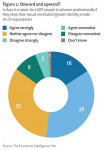Regional or global? No single model ideal for all sustainability programmes, says Economist Intelligence Unit
The report is based on findings of a global survey of more than 220 executives in multinational corporations that have sustainability programmes, complemented by in-depth interviews with business leaders and other experts around the world. It concludes that firms tend to favour global programmes even when regional ones are often more effective.
Key findings of the report include:
· While companies are almost evenly split between global and regional approaches, they are still experimenting to find which type of programme is optimal for them. Our survey found that 54% of executives have adopted a regional approach, while 46% seek a more global structure. In the future, executives say that their companies will change their approach. Despite their conclusion that a regional focus works better (65% of respondents), most executives (56%) say that their companies will have a global programme in three years. Furthermore, 60% of respondents whose companies have a regional focus expect to switch to a global approach, while one-quarter of those now favouring a global approach believe that their company will take on a regional focus.
· Global and regional approaches each have distinct challenges and advantages. Management buy-in, data-collection on appropriate metrics, the integration of sustainability into corporate processes are among the main challenges for all companies implementing sustainability programmes. Those with regionally focused approaches grapple especially with gaining attention of corporate-level management. For globally focused companies, the impact of regulators, particularly from their home country, is a defining force.
· Overall, companies are more satisfied with the global approach. Companies with a global approach were more likely than firms with a regional one to rank themselves higher than competitors in sustainability performance. Executives report that, overall, a global approach is more consistent in addressing sustainability priorities on both a regional (66%) and global level (75%). This may explain the shift by the majority of executives towards globally focused programmes in the future.
Sustainability across borders is available free of charge at: www.eiu.com/sponsor/sas/sustainability
Notes for editors
Sustainability across borders is an Economist Intelligence Unit report, sponsored by SAS. The research is based on an online survey of 226 senior executives from around the world conducted by the Economist Intelligence Unit in August and September 2008. Thirty-six percent of the executives were in Europe, 28% in North America, 22% in Asia-Pacific and 14% in the rest of the world. Participants represented 19 different industries, of which the top three were financial services, professional services and manufacturing. Fifty-five percent of the respondents’ organisations had annual revenues of more than US$500 million. The quantitative survey was supplemented with interviews with executives and experts worldwide who addressed sustainability issues with globally unified of regionally focused approaches.
About the Economist Intelligence Unit
The Economist Intelligence Unit is the world leader in global business intelligence. It is the business–to–business arm of The Economist Group, which publishes The Economist newspaper. As the world's leading provider of country intelligence, the Economist Intelligence Unit helps executives make better business decisions by providing timely, reliable and impartial analysis on worldwide market trends and business strategies. More information about the Economist Intelligence Unit can be found at www.eiu.com.
About SAS
SAS is the leader in business analytics software and services, and the largest independent vendor in the business intelligence market. With innovative business applications supported by an enterprise intelligence platform, SAS helps customers at 45,000 sites improve performance and deliver value by making better decisions faster.
웹사이트: http://www.eiu.com
연락처
Joanne McKenna
Press Liaison
Economist Intelligence Unit
26 Red Lion Square
London
WC1R 4HQ
UK
Direct: +44 (0) 20 7576 8188
Sales: +44 (0) 20 7576 8181
Switchboard: +44 (0) 20 7576 8000
email: 이메일 보내기
이 보도자료는 Economist Intelligence Unit가(이) 작성해 뉴스와이어 서비스를 통해 배포한 뉴스입니다. 뉴스와이어는 편집 가이드라인을 준수합니다.




